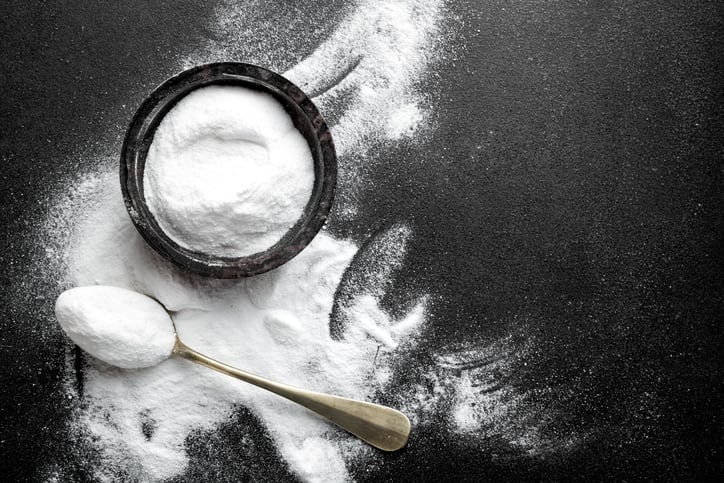Consumption of sugar-free foods is on the rise thanks to a lower calorie count and mounting public concern over the health implications of high sugar diets.
Non-nutritive sweeteners, including various natural and artificial food additives, are significantly sweeter than sucrose and are commonly used as sugar substitutes. For instance, aspartame, an artificial sweetener, and stevia, a natural low-calorie sweetener extracted from a plant native to South America, are 200-400 times sweeter than sugar.
Current dietary advice suggests that both natural and artificial sweeteners and sugar substitutes are safe to consume during pregnancy. However, a new study, published in journal Gut, calls this conclusion into question.
The research, led by Dr. Raylene Reimer, suggested the consumption of low-calorie sweeteners by pregnant and breastfeeding women can be linked to increased body fat in their offspring. The research also flagged disruptions in their gut microbiota - the trillions of bacteria and other microorganisms that inhabit the intestinal tract, affecting our health and disease risk.
"Low-calorie sweeteners are considered safe to consume during pregnancy and lactation, however evidence is emerging from human studies to suggest they may increase body weight and other cardiovascular risk factors," explained Dr Reimer of the University of Calgary.
"Even stevia, which is hailed as a natural alternative to aspartame and other low-calorie artificial sweeteners, showed a similar impact on increasing offspring obesity risk in early life."
A healthier future for mother and child?
The consumption of low-calorie sweeteners is largely driven by health concerns in response to rising obesity rates. But Dr Reimer warned that the reverse could actually be true.
The study linked daily consumption with ‘large babies’ and early menstruation in girls under 10 years - a known risk factor for chronic diseases.
The presence of some - but not all - non-nutritive sweeteners has been detected in breastmilk - presenting a potential mode of transmission, according to the study.
"Understanding the impact of dietary ingredients on maternal metabolism and gut microbiota may help to define the optimal maternal diet, one which promotes a healthier future for both mother and child," argued Dr Reimer.
The researchers acknowledged that understanding of the impact of sweeteners on weight gain is ‘not complete’ and suggested that there is ‘reason to believe’ alternations in the gut microbiome play a ‘key role’.
In this animal study, a faecal transplant was used to show the direct influence of altered gut microbiota on increased obesity risk. Transplanting faecal matter from the offspring of mothers that consumed the low-calorie sweeteners into sterile, germ free mice caused the mice to gain more weight and have worse blood glucose control. Even though the offspring had never consumed the sweeteners themselves, the changes to mothers' microbiota and metabolism was sufficient to change the microbiota in their offspring and trigger obesity, the researchers noted.
Maternal exposure to sweeteners ‘does not increase’ body weight: ISA
The International Sweeteners Association (ISA) stressed that the ‘collective evidence’ suggests that exposure to low and no-calorie sweeteners during pregnancy and lactation does not increase body weight in children.
A spokesperson pointed to the conclusions drawn in recent meta-analysis of animal studies published in Physiology & Behavour which concluded: “Non-nutritive sweetener consumption during pregnancy and/or lactation reduced bodyweight in dams and offspring.”
The ISA spokesperson told FoodNavigator: “The latter thorough review considered the totality of available studies investigating the metabolic and behavioural effects of maternal exposure to low/no calorie sweeteners during pregnancy and lactation. It pointed to the balance of evidence suggesting that maternal exposure to low/no calorie sweeteners in the diet does not increase body weight in offspring.
“Furthermore, the claims ... that the effects of low/no calorie sweeteners, and especially of aspartame, on the gut microbiota played a causal role in mediating adverse body composition outcomes, are neither supported by current data nor can be explained by the well-established metabolic fate of aspartame in the human body.”
The ISA spokesperson argued aspartame is digested and absorbed in the small intestine, meaning ‘neither aspartame nor its metabolites ever reach the colon for potential direct interaction with, or effects on, the human gut microbiota ‘.
“Overall, there is strong evidence from high-dose, long-term studies, that low/no calorie sweeteners have no adverse effect on gut function or health, and recent reviews of the published literature provide no evidence of any adverse effect of low/no calorie sweeteners on the gut microbiota at doses relevant to human use.”
And, while the ISA said low and no calorie sweeteners are ‘no magic bullet’ they remain a ‘simple’ way to reduce calorie and sugar consumption.
Buying research bias?
Robert Verkerk, founder, executive and scientific director of the Alliance for Natural Health, dismissed the conclusion that, because the majority of research downplays the impact of low calorie sweeteners on the microbiome, consumption must have little or no impact.
“The food industry has long been party to funding biased research that suits its business goals,” he told this publication, pointing to the 2007 paper from professor David Ludwig's team from the Children's Hospital in Boston and published in PLoS One.
The review evaluated 206 nutritional studies that investigated the health effects of soft drinks, fruit juices and milk, with or without industry funding. Findings showed that sponsorship bias was ‘as rife in the food industry as the pharmaceutical industry’, with benefit found in 32% of interventional studies funded by food/drink companies, as against zero for those that were not industry funded.
“The food and drinks industry is finding it hard to come to term with the rapidly increasing body of scientific evidence pointing to harms linked to artificial sweeteners. It continues to push these zero or low-calorie alternatives, avoiding any suggestion that they might not help people lose weight or reduce their diabetes risk, while also being potentially harmful.
“Growing evidence suggests that these sweeteners increase the risk of metabolic syndrome, insulin resistance and glucose tolerance, all contributing factors to the type 2 diabetes and obesity epidemics.”
Sources
‘Maternal low-dose aspartame and stevia consumption with an obesogenic diet alters metabolism, gut microbiota and mesolimbic reward system in rat dams and their offspring’
Gut
DOI: http://dx.doi.org/10.1136/gutjnl-2018-317505
Authors: Jodi E Nettleton, Nicole A Cho, Teja Klancic, Alissa C Nicolucci, Jane Shearer, Stephanie L Borgland, Leah A Johnston, Hena R Ramay, Erin Noye Tuplin, Faye Chleilat, Carolyn Thomson, Shyamchand Mayengbam, Kathy D McCoy,Raylene A Reimer
Metabolic and behavioural effects of prenatal exposure to non-nutritive sweeteners: A systematic review and meta-analysis of rodent models
Physiology & Behavior
DOI:
https://doi.org/10.1016/j.physbeh.2019.112696
Authors: H.L.Morahan, C.H.C.Leenaars, R.A.Boakes, K.B.Rooney
Relationship between Funding Source and Conclusion among Nutrition-Related Scientific Articles
PLoS One
DOI: https://doi.org/10.1371/journal.pmed.0040005
Lenard I Lesser, Cara B Ebbeling, Merrill Goozner, David Wypij, David S Ludwig




